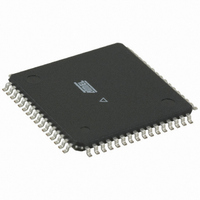ATMEGA128A-ANR Atmel, ATMEGA128A-ANR Datasheet - Page 104

ATMEGA128A-ANR
Manufacturer Part Number
ATMEGA128A-ANR
Description
IC MCU AVR 128K FLASH 64TQFP
Manufacturer
Atmel
Series
AVR® ATmegar
Specifications of ATMEGA128A-ANR
Core Processor
AVR
Core Size
8-Bit
Speed
16MHz
Connectivity
EBI/EMI, I²C, SPI, UART/USART
Peripherals
Brown-out Detect/Reset, POR, PWM, WDT
Number Of I /o
53
Program Memory Size
128KB (64K x 16)
Program Memory Type
FLASH
Eeprom Size
4K x 8
Ram Size
4K x 8
Voltage - Supply (vcc/vdd)
2.7 V ~ 5.5 V
Data Converters
A/D 8x10b
Oscillator Type
Internal
Operating Temperature
-40°C ~ 85°C
Package / Case
64-TQFP
Core
AVR8
Lead Free Status / RoHS Status
Lead free / RoHS Compliant
Available stocks
Company
Part Number
Manufacturer
Quantity
Price
- Current page: 104 of 386
- Download datasheet (8Mb)
14.9
8151H–AVR–02/11
Asynchronous Operation of Timer/Counter0
Figure 14-11. Timer/Counter Timing Diagram, Clear Timer on Compare Match Mode, with Pres-
When Timer/Counter0 operates asynchronously, some considerations must be taken.
• Warning: When switching between asynchronous and synchronous clocking of
1. Disable the Timer/Counter0 interrupts by clearing OCIE0 and TOIE0.
2. Select clock source by setting AS0 as appropriate.
3. Write new values to TCNT0, OCR0, and TCCR0.
4. To switch to asynchronous operation: Wait for TCN0UB, OCR0UB, and TCR0UB.
5. Clear the Timer/Counter0 interrupt flags.
6. Enable interrupts, if needed.
• The Oscillator is optimized for use with a 32.768 kHz watch crystal. Applying an external
• When writing to one of the registers TCNT0, OCR0, or TCCR0, the value is transferred to a
• When entering Power-save or Extended Standby mode after having written to TCNT0,
Timer/Counter0, the Timer Registers TCNT0, OCR0, and TCCR0 might be corrupted. A safe
procedure for switching clock source is:
clock to the TOSC1 pin may result in incorrect Timer/Counter0 operation. The CPU main
clock frequency must be more than four times the Oscillator frequency.
temporary register, and latched after two positive edges on TOSC1. The user should not
write a new value before the contents of the Temporary Register have been transferred to its
destination. Each of the three mentioned registers have their individual temporary register,
which means that, for example, writing to TCNT0 does not disturb an OCR0 write in progress.
To detect that a transfer to the destination register has taken place, the Asynchronous Status
Register – ASSR has been implemented.
OCR0, or TCCR0, the user must wait until the written register has been updated if
Timer/Counter0 is used to wake up the device. Otherwise, the MCU will enter sleep mode
before the changes are effective. This is particularly important if the Output Compare0
interrupt is used to wake up the device, since the output compare function is disabled during
writing to OCR0 or TCNT0. If the write cycle is not finished, and the MCU enters sleep mode
before the OCR0UB bit returns to zero, the device will never receive a compare match
interrupt, and the MCU will not wake up.
TCNTn
(clk
(CTC)
OCRn
OCFn
clk
clk
I/O
I/O
Tn
/8)
caler (f
clk_I/O
TOP - 1
/8)
TOP
TOP
BOTTOM
ATmega128A
BOTTOM + 1
104
Related parts for ATMEGA128A-ANR
Image
Part Number
Description
Manufacturer
Datasheet
Request
R

Part Number:
Description:
Manufacturer:
ATMEL Corporation
Datasheet:

Part Number:
Description:
Microcontroller with 128K bytes In-system programmable flash, 8 MHz, power supply =2.7 - 5.5V
Manufacturer:
ATMEL Corporation
Datasheet:

Part Number:
Description:
IC AVR MCU 128K 16MHZ 5V 64TQFP
Manufacturer:
Atmel
Datasheet:

Part Number:
Description:
IC AVR MCU 128K 16MHZ 5V 64-QFN
Manufacturer:
Atmel
Datasheet:

Part Number:
Description:
IC AVR MCU 128K 16MHZ COM 64-QFN
Manufacturer:
Atmel
Datasheet:

Part Number:
Description:
IC AVR MCU 128K 16MHZ 64-TQFP
Manufacturer:
Atmel
Datasheet:

Part Number:
Description:
IC AVR MCU 128K 16MHZ 64-TQFP
Manufacturer:
Atmel
Datasheet:

Part Number:
Description:
IC AVR MCU 128K 16MHZ IND 64-QFN
Manufacturer:
Atmel
Datasheet:

Part Number:
Description:
MCU AVR 128KB FLASH 16MHZ 64TQFP
Manufacturer:
Atmel
Datasheet:

Part Number:
Description:
MCU AVR 128KB FLASH 16MHZ 64QFN
Manufacturer:
Atmel
Datasheet:

Part Number:
Description:
MCU AVR 128KB FLASH 16MHZ 64TQFP
Manufacturer:
Atmel
Datasheet:











